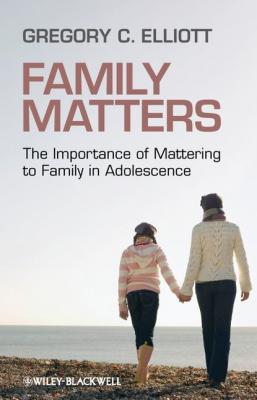Family Matters. Группа авторов
Общая психология.Family Matters
Год выпуска 0
isbn 9781444305791
Автор произведения Группа авторов
Жанр Общая психология
Издательство John Wiley & Sons Limited
Combining empirical evidence with indices to measure mattering, Family Matters: The Importance of Mattering to Family in Adolescence explores the inverse relationship between mattering and dysfunctional behavior in adolescence. Defines mattering and distinguishes among the three ways that people can matter to others: awareness, importance, and reliance Utilizes empirical evidence from a quantitative analyses of data from a nationwide survey 2,004 adolescents to support author’s assertions Explores the impact of structural and demographic factors such as family structure in developing of a sense of mattering in adolescents. Includes helpful indices, including his Mattering Index and Rosenberg’s Self-Esteem Index Suggests how parents, teachers, and other significant people in the lives of adolescents can work to instill a sense of mattering in those under their care
